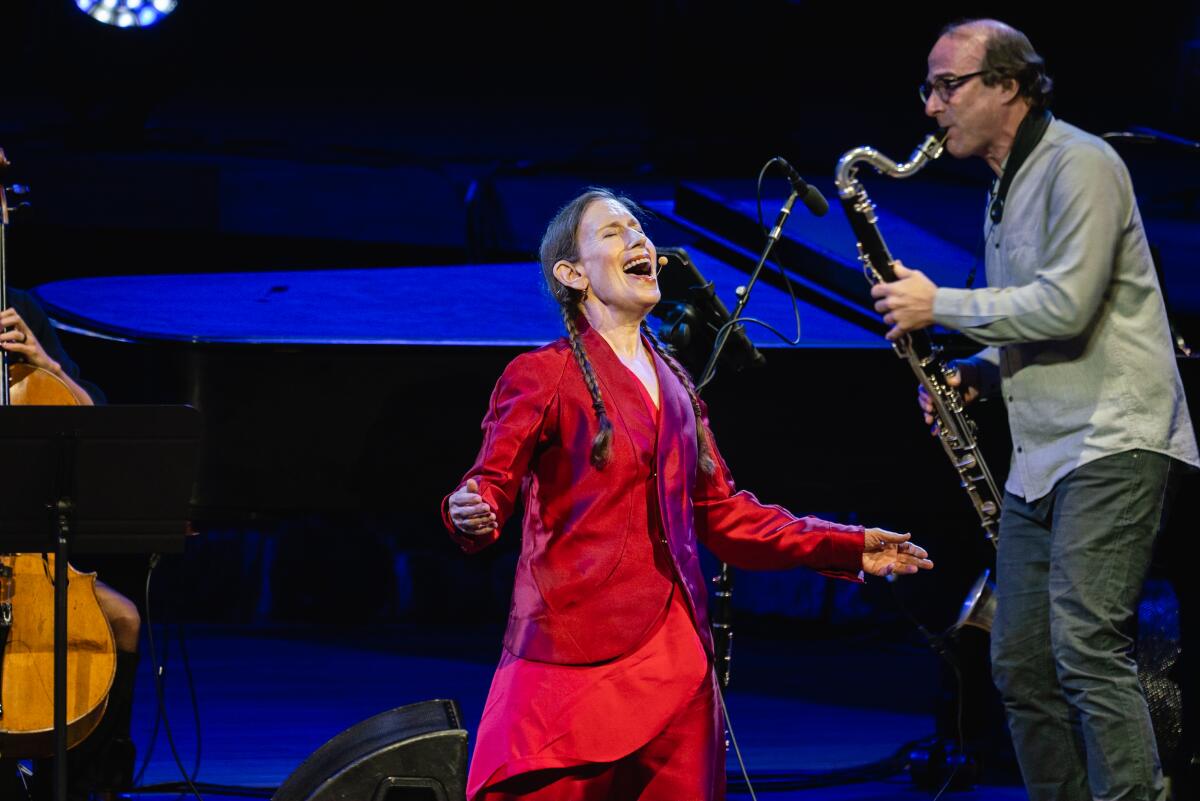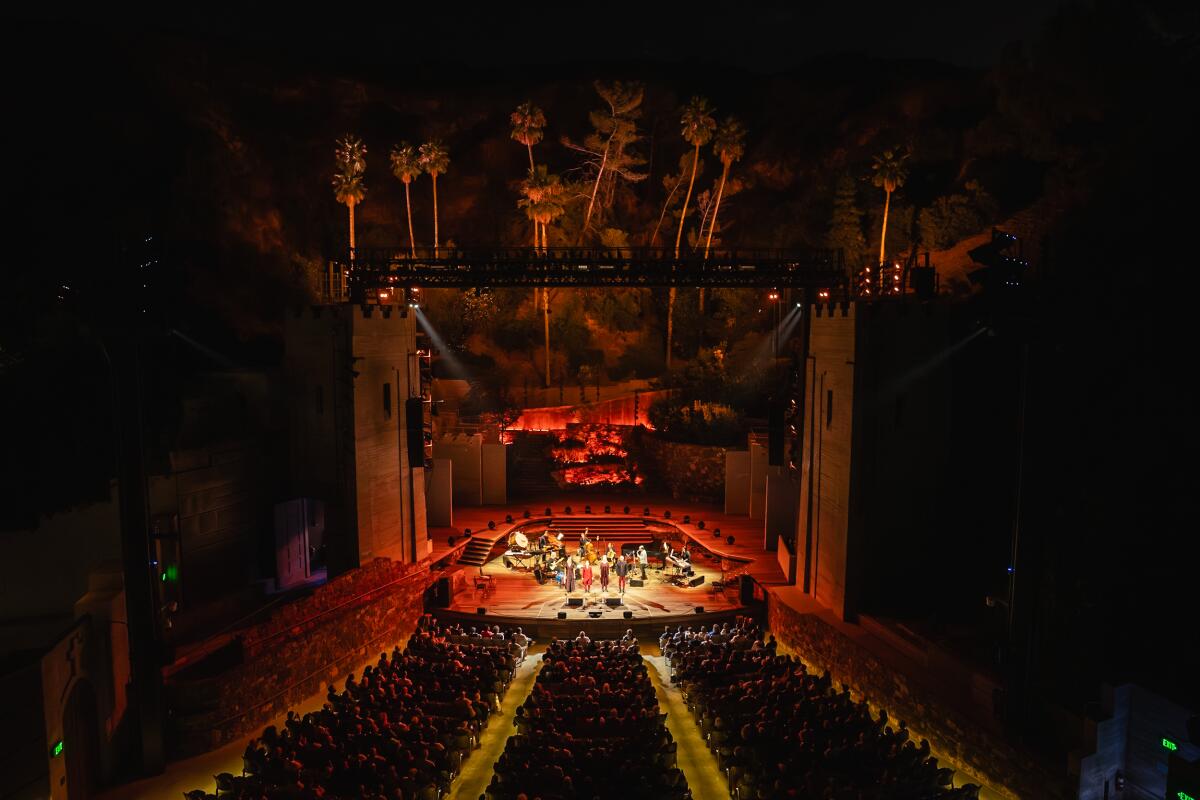Review: Meredith Monkâs â80s post-nuclear space opera is startlingly prescient

In 1983, as an Orwellian 1984 loomed, the American composer, choreographer and dancer Meredith Monk found herself in Berlin. Nowhere was the Cold War more proximate than in this walled city, as Soviet missiles in East Berlin threatened West Berlin.
Monk had been asked to make a new work for the bold theater company SchaubĂźhne am Halleschen Ufer. Her response? âLetâs do a piece about the aesthetics of fascism,â she said at the Ford Theatre on Thursday night, when she introduced excerpts from âThe Gamesâ as part of her performance with Bang on a Can All-Stars.
In the science fiction opera she created with librettist Ping Chong, survivors from a nuclear holocaust on Earth, or global warming, have relocated somewhere in outer space. They attempt a ritual in which elders pass on Earthâs culture to the young. That is, what they can remember of it â and what members of different cultures who speak different languages can communally piece together. Memory plays tricks. Fascism plays tricks. History repeats itself, again and again in the workâs four sections. A Gamemaster, with rock star charisma, turns into a dictator.
âThe Gamesâ was brought to the Brooklyn Academy of Music in the fall of 1984, but then was promptly forgotten. Monk does not include it on her website among the list of such classics as âQuarryâ âEllis Islandâ and 1981âs âSpecimen Days: A Civil War Operaâ that preceded it. Several great works, the opera âAtlas,â and âOn Behalf of Natureâ among them, have followed. Monk never recorded âThe Gamesâ completely, but a few songs from it are on several of her recordings, and a couple numbers have remained in her repertoire over the years or been done by other musicians. Her music has appealed to figures as varied as BjĂśrk, Caetano Veloso and the Dalai Lama.
Bang on a Can, the New York new music collective founded shortly after Monk staged âThe Gamesâ at BAM, has, however, come partially to the rescue. Three years ago, the stellar All-Stars, the collectiveâs ensemble, released the extraordinary Monk recording âMemory Game.â It includes new arrangements by the three BoaC founders â David Lang, Michael Gordon and Julia Wolfe â centered on several numbers from âThe Games.â For the live performance at the Ford, Monk and three of her longtime singers joined the All-Stars to perform some of the recording.
It was a lovely night on Earth. The Ford happens to be the most enchanted of L.A.âs major outdoor venues and was beautifully lighted. The super blue moon of the night before retained enough lunar presence to remind us of what is at stake here on an Earth, and how we continually find new ways to jeopardize it. Monk felt startlingly prescient. She was of the moment in 1983. She is of the moment today.

And yet, Monkâs marvelment is her merriment. She is renowned for her pioneering role in the development of extended vocal techniques, although the extensions go far beyond the vocal cords anatomically and musically. Voice and body movement merge into a singular expression. Shouts, squeals, whoops, cries, wails and those voluble outbursts we have no name for but immediately recognize as primal emotions are elemental to her song vocabulary. Voice, mind, spirit and being are one.
The instrumental ensemble was slightly different from the recording. The bassist Robert Black, one of the founders of the ensemble and a noted figure in contemporary music, died in June and the concert was dedicated to his memory. Eleonore Oppenheim admirably filled his shoes. The other All-Stars included pianist Vicky Chow, percussionist David Cossin, cellist Arlen Hlusko, electric guitarist Mark Stewart and clarinetist Ken Thomson. Monk was joined by three of the collectiveâs longtime singers, Katie Geissinger, Allison Sniffin and Theo Bleckmann.
There was an extraordinary amount of modern American music memory, excellence and importance on the stage, along with those other memories from âThe Gamesâ: mushrooms, morning coffee, aspirin, saying grace, Shakespeareâs garden. All of this is delivered with Monkâs characteristic bounce. Melodies are simple and elegant, like those of Satie. Monk has a minimalistâs and a childâs joy in repetition. She is a folk singer but of a folk weâve never before encountered. Geissinger, Sniffin and Bleckmann each added something new and elemental.
The new instrumental arrangements enhanced but changed little from the recordings. In âMemory Song,â for instance, Wolfe hauntingly colorized with silvery percussive accompaniment, marvelously melodic clarinet and cello lines and interruptions of chirping bird song, Monkâs singing of forgetting and football. When the recording first came out, I couldnât get enough of that.
Along with the songs from âThe Games,â Monk includes a handful of numbers from other wanderings. One is a hilariously goofy âTokyo Cha Cha,â also from 1983. Langâs arrangement of âDouble Fiestaâ ended the program as triumphant celebration, Monk happily ha-ha-ha-ing and ho-ho-ho-ing, the ensemble finding a groove that, in the best of worlds, would go on forever.
Preserve the joy, Monk reveals in âMemory Game,â and maybe, just maybe, weâll remember to save the world.
More to Read
The biggest entertainment stories
Get our big stories about Hollywood, film, television, music, arts, culture and more right in your inbox as soon as they publish.
You may occasionally receive promotional content from the Los Angeles Times.











